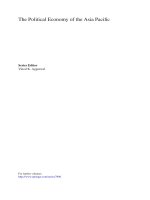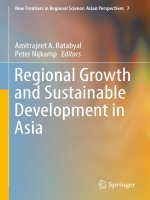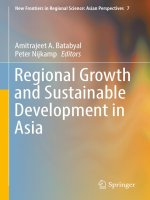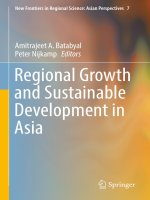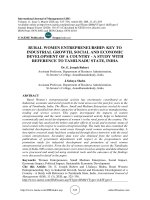Economic growth and economic development 207
Bạn đang xem bản rút gọn của tài liệu. Xem và tải ngay bản đầy đủ của tài liệu tại đây (63.12 KB, 1 trang )
Introduction to Modern Economic Growth
In places with a large indigenous population, Europeans could exploit the population. This was achieved in various forms, using taxes, tributes or employment as
forced labor in mines or plantations. This type of colonization was incompatible
with institutions providing economic or civil rights to the majority of the population. Consequently, a more developed civilization and a denser population structure
made it more profitable for the Europeans to introduce worse economic institutions.
In contrast, in places with little to extract, and in sparsely-settled places where
the Europeans themselves became the majority of the population, it was in their
interests to introduce economic institutions protecting their own property rights
(and also to attract further settlers).
4.4.4. Settlements, Mortality and Development. The initial conditions
of the colonies we have emphasized so far, indigenous population density and urbanization, are not the only factors affecting Europeans’ colonization strategy. In
addition, the disease environments differed markedly among the colonies, with obvious consequences on the attractiveness of European settlement. Since, as we noted
above, when Europeans settled, they established institutions that they themselves
had to live under, whether Europeans could settle or not had a major effect on the
subsequent path of institutional development. In other words, we expect the disease
environment 200 or more years ago, especially the prevalence of malaria and yellow
fever which crucially affected potential European mortality, to have shaped the path
of institutional development in the former European colonies and via this channel,
current institutions and current economic outcomes. If in addition, the disease environment of the colonial times affects economic outcomes today only through its
effect on institutions, then we can use this historical disease environment as an
exogenous source of variation in current institutions. From an econometric point
of view, this will correspond to a valid instrument to estimate the casual effect of
economic institutions on prosperity. Although mortality rates of potential European settlers could be correlated with indigenous mortality, which may determine
income today, in practice local populations had developed much greater immunity
to malaria and yellow fever. Acemoglu, Johnson and Robinson (2001) present a
193



